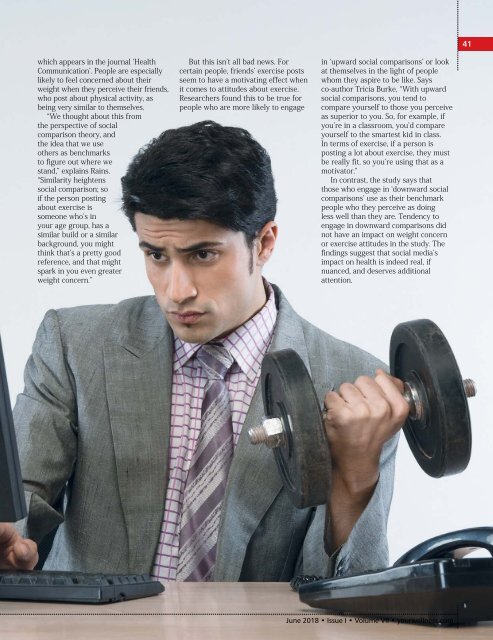Mahindra Partner_Issue_June_2018
Create successful ePaper yourself
Turn your PDF publications into a flip-book with our unique Google optimized e-Paper software.
41<br />
which appears in the journal ‘Health<br />
Communication’. People are especially<br />
likely to feel concerned about their<br />
weight when they perceive their friends,<br />
who post about physical activity, as<br />
being very similar to themselves.<br />
“We thought about this from<br />
the perspective of social<br />
comparison theory, and<br />
the idea that we use<br />
others as benchmarks<br />
to figure out where we<br />
stand,” explains Rains.<br />
“Similarity heightens<br />
social comparison; so<br />
if the person posting<br />
about exercise is<br />
someone who’s in<br />
your age group, has a<br />
similar build or a similar<br />
background, you might<br />
think that’s a pretty good<br />
reference, and that might<br />
spark in you even greater<br />
weight concern.”<br />
But this isn’t all bad news. For<br />
certain people, friends’ exercise posts<br />
seem to have a motivating effect when<br />
it comes to attitudes about exercise.<br />
Researchers found this to be true for<br />
people who are more likely to engage<br />
in ‘upward social comparisons’ or look<br />
at themselves in the light of people<br />
whom they aspire to be like. Says<br />
co-author Tricia Burke, “With upward<br />
social comparisons, you tend to<br />
compare yourself to those you perceive<br />
as superior to you. So, for example, if<br />
you’re in a classroom, you’d compare<br />
yourself to the smartest kid in class.<br />
In terms of exercise, if a person is<br />
posting a lot about exercise, they must<br />
be really fit, so you’re using that as a<br />
motivator.”<br />
In contrast, the study says that<br />
those who engage in ‘downward social<br />
comparisons’ use as their benchmark<br />
people who they perceive as doing<br />
less well than they are. Tendency to<br />
engage in downward comparisons did<br />
not have an impact on weight concern<br />
or exercise attitudes in the study. The<br />
findings suggest that social media’s<br />
impact on health is indeed real, if<br />
nuanced, and deserves additional<br />
attention.<br />
<strong>June</strong> <strong>2018</strong> • <strong>Issue</strong> I • Volume VII • yourwellness.com

















